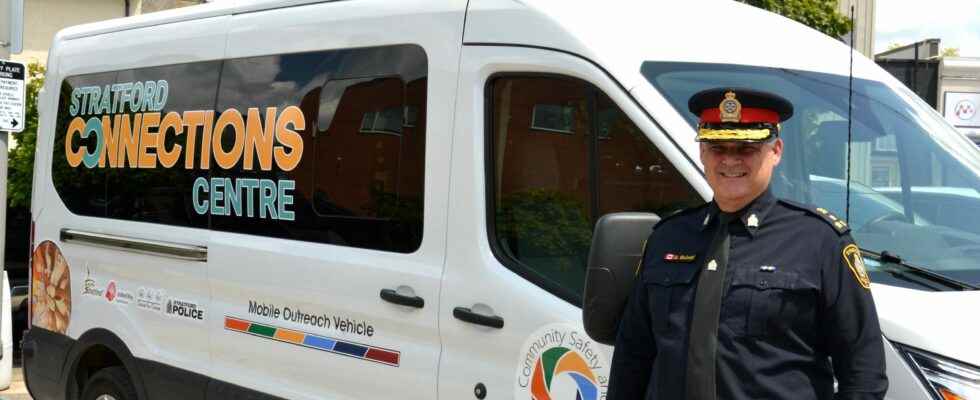Thanks to a partnership between the Stratford Police Service, the Stratford Connections Center and other local agencies, a new mobile outreach program is bringing supplies and support directly to those experiencing homelessness in the city.

Thanks to nearly $100,000 in funding secured by the Stratford Police Service, a new mobile outreach program operated by the Stratford Connections Center is bringing support and a friendly face to those experiencing homelessness in Stratford.
In early 2020, before the pandemic, the Stratford Police Service applied for funding through the province’s Civil Remedies Grant program, which, in part, provides funding from the sale of personal property seized by police across the province to help local police services and their community partners establish programs and services that benefit the vulnerable populations they serve.
“One of the things we had talked about amongst the stakeholders here in Stratford was starting up a mobile outreach program for those vulnerable people who were living on the streets and had nowhere to go — this was pre-Connections Centre,” Stratford police Chief Greg Skinner said.
While the police service was successful with their application for funding, which covered the cost of the van and supplies necessary for a mobile outreach program, the onset of the COVID-19 pandemic initially delayed that program’s implementation. However, once the Stratford Connections Center was established late last year as a place where people experiencing homelessness can access basic and social-support services in the city, Skinner said the police service opted to partner with Choices For Change — the organization that operates the center — to implement this outreach program.
“The outreach van allows our outreach team to extend supports throughout the city,” said connections center coordinator Tanya Hefkey. “It’s really about breaking down barriers for folks. So for those folks who are in encampments, maybe, at the outskirts of the city, our outreach vehicle can go out to them where they’re at and bring them basic-needs supplies — food, water, that sort of stuff. They also visit people who are staying in emergency shelter in our motels, bring them food and offer them emotional support, encouraging them to come down to the connections centre.”
In addition to food, water and emotional support, the outreach team also offers transportation to medical appointments and they have cell phones and other mobile devices those experiencing homelessness can use to place phone calls or access the internet to find support services, schedule appointments or to communicate with family and friends.
The outreach team is staffed by people who have lived experience with homelessness. Having lived through similar circumstances as those they serve allows the outreach workers to understand their situations on a personal level and respond to their individual needs while also showing them that there is an achievable path to permanent, stable housing, Hefkey explained.
Those outreach workers can also help ease fears around taking advantage of the services offered at the connections center by offering to accompany them on their first visit and introduce them to the staff and community support-service representatives who work on site.
“I can’t tell you how many people were hesitant to come into the connections centre, but because (our outreach workers) already knew them, they were able to say, ‘Come down when I’m there. I’ll show you around, you can see what it’s like and then if you want to stay, you can stay,’ ” Hefkey said.
For Skinner and the Stratford police, the mobile outreach program is another in a series of partnerships between local police and service providers that leverages existing expertise in the community to serve vulnerable people in the best way possible.
“The police will always have a role in dealing with these social issues, but quite frankly, we don’t have the expertise and it’s not in our primary mandate to deal with mental health and addiction and homelessness,” Skinner said. “So we are a player, we’re a stakeholder, but the other agencies have the primary mandate and we want to be there to support them the same way (they) … support us.
“And let’s face it. People living on the streets have a higher propensity to be victimized and they need help as well. So our ability to know where they are, to be able to check on them to make sure they’re safe, is all part of that wrap-around service. It’s not about arresting people, it’s not about incarcerating, it’s not about developing criminal intelligence to use it for some other means. It’s about being able to support people and making sure they’re safe. That’s what this is all about.”
